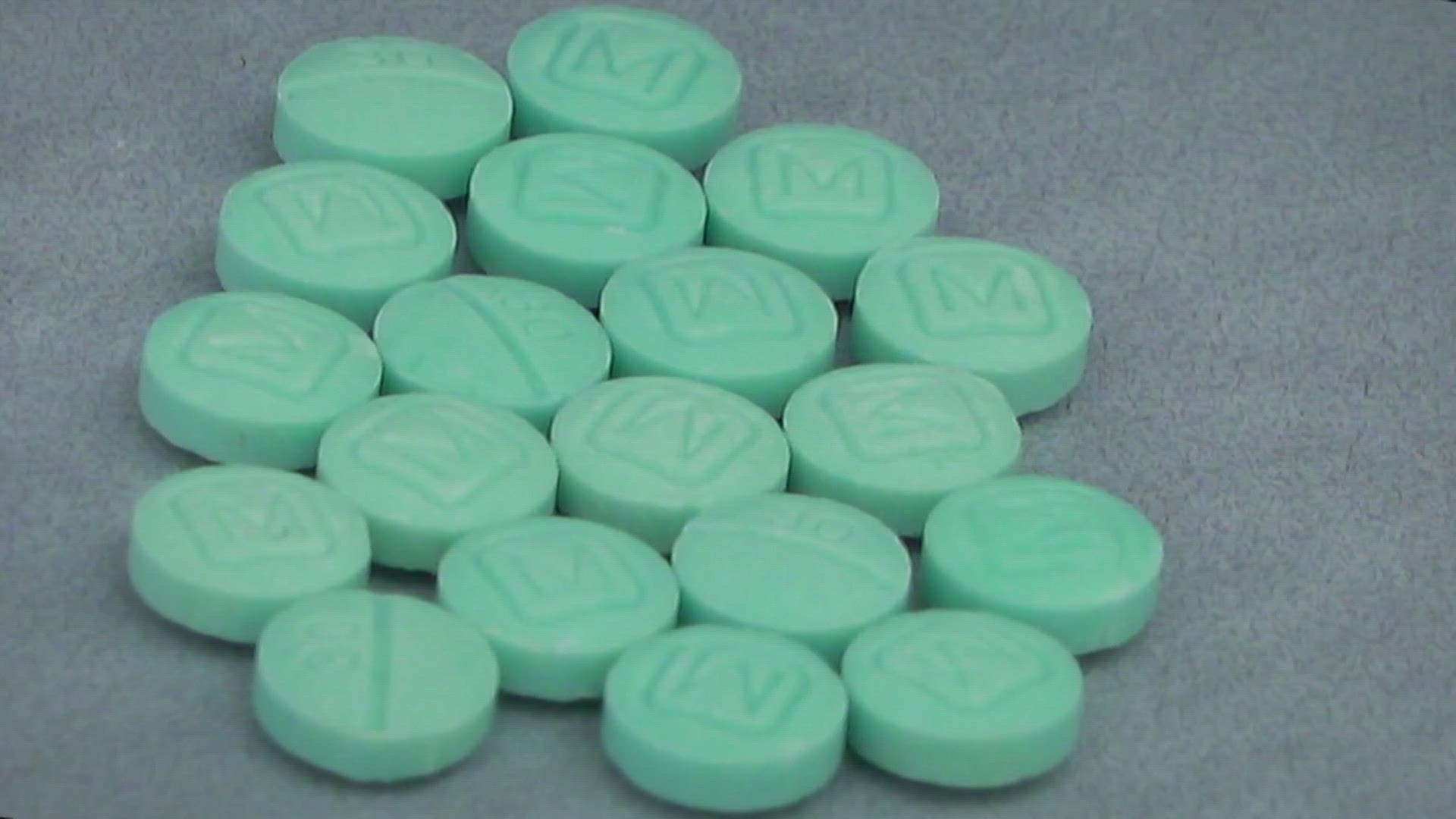INDIANAPOLIS — "Fentanyl is very common right now, and I don't know fentanyl will go away soon," said Dr. Blake Froberg, medical director for the Indiana Poison Center.
Nearby, a recovery team called Project POINT is designed to serve overdose survivors.
"They have unique perspective," said Dr. Tyler Stepsis, chief of the Michael & Susan Smith Eskenazi Health Emergency Department. "They do a lot of motivational interviewing and also finding what works best for the patient."
Stepsis said Project POINT can accrue up to 400 new cases a month, with the majority of those overdoses containing fentanyl.
"Rarely, if ever, do I need a drug screen to diagnose this," he said.
That's because Dr. Stepsis said opioids tend to present similarly in patients, regardless of the drugs used.
Some of the common signs of drug overdose, including fentanyl, are low respiratory rates, small pupils, and little to no response to pain, according to Stepsis.
In March, California became the first and only state to require fentanyl tests during emergency room drug screenings.
Here at home, Stepsis is one of many central Indiana doctors who disagree with mandating the additional test, despite fentanyl-related deaths setting records for two years in a row.
"You have to assume that fentanyl is there," said Stepsis. "So why test for something that you know is already there?"
Doctors say adding a fentanyl test, once a patient is already in emergency care, will not affect how that person receives care.
"Does it change our outlook when it comes to emergency department care, especially trying to get people access to long-term treatment?" asked Stepsis. "No, it doesn't at all."
Dr. Froberg agrees. In addition to working for the Indiana Poison Center, he is also a medical toxicologist at Indiana University Health.
Froberg said one additional test inside emergency departments will not change patient care.
"We already know how to manage that from a medical standpoint," he said.
While local hospitals can, and do, to test for fentanyl, mandating it statewide for every suspected overdose is unnecessary, he said.
Instead, Froberg said the choice to test should be left to the doctor, instead of the state.
"The physician taking care of the patient can have discretion for what test will be useful for taking care of their patient and which test would not be useful and potentially just add cost to the management of their patient," he said.
"That is where the biggest part of this lies," said Stepsis. "You have to make sure that you're looking at the patient and not a number and not a test result."
Currently, NBC News reports the added fentanyl test would cost a hospital 75 cents per test. The patient, however, would see a much higher price, according to Stepsis.
Both doctors agree that adding a required fentanyl test could benefit certain populations.
"More information sometimes can be helpful," said Froberg.
For example, a test could prove useful for people in maintenance therapy for opioid use disorder or children who may have consumed drugs.
"It can be helpful then to guide, 'how long do we think that this patient will have symptoms?'" said Froberg, "and then making sure we get all the services involved to make sure that patient is safe, as well."
13News took this debate to the Indiana Hospital Association, who shared the following statement:
"As the federal government looks to add fentanyl to standard testing practices, hospitals will continue to provide evidence-based testing and treatment, as determined by the patient’s physician, to each patient based on their individual needs. After substance use is identified, ongoing mental health treatment is critical and Indiana hospitals are dedicated to addressing the drivers of substance abuse through community partnerships, education, and behavioral health services. Our doors are open 24 hours a day, 7 days a week to provide lifesaving care to all."
As for Dr. Stepsis and Dr. Froberg, they are "saying no" to mandatory testing.
"If you are going to mandate anything," said Stepsis, "mandate that people get the appropriate resources they need to access care."
For example, Stepsis said Project POINT hands out fentanyl test strips to patients who are not ready to quit their drug use.
"That way, they know what they are really ingesting," said Stepsis.
Additionally, doctors say Indiana should focus more of its money on awareness, education and treatment.
"Without that access to care and that long-term care and that access to medication assisted treatment," said Stepsis, "the cravings typically win."
Currently, doctors say they are seeing a negative stigma surrounding medical treatments of opioid use disorders. However, Stepsis encourages Hoosiers to look at it like high blood pressure or diabetes.
"You might need medication to fix it," he said, "and that's okay."
"I fully support any efforts that help to take care of patients that have overdosed on fentanyl," said Froberg, "and I definitely support any of the support to addiction medicine and resources that can then help people who have overdosed on fentanyl and survived to get the help that they need to hopefully prevent future use of fentanyl."
Froberg also encourages parents to speak to their children about the dangers surrounding recreational drug use.
"Just because it's a pill doesn't mean that it's safe," said Froberg.

